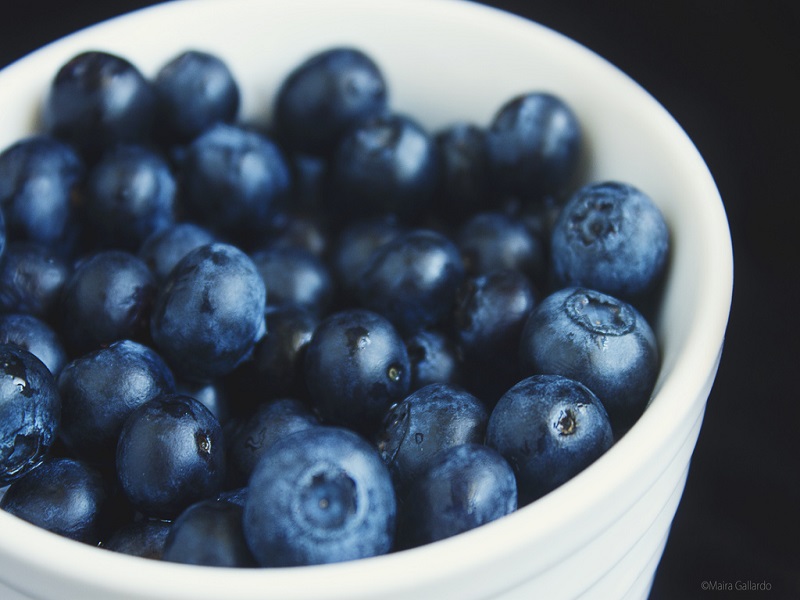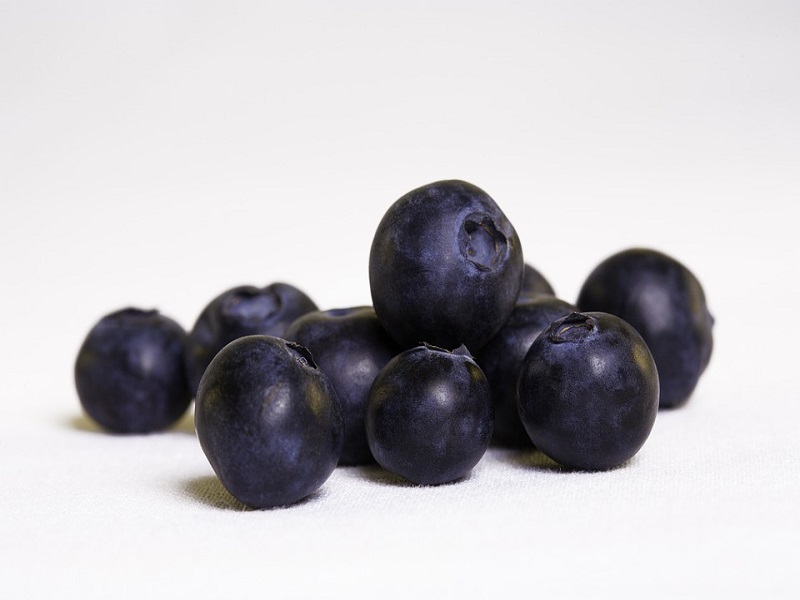via Cure Joy: Blueberry pie, blueberry cheesecake, blueberry smoothies… what’s not to love about this delectable berry that makes delicious desserts even better? Well, there’s a lot more to it. Blueberries are an antioxidant powerhouse and are among the foods with the highest antioxidant content. They are loaded with vitamins C, B2, B6, E and K, resveratrol, gallic acid, lutein, zeaxanthin, copper, manganese, and fiber.
They are also extremely rich in a variety of polyphenols, anthocyanins (which give them their beautiful color) and phytochemicals, especially flavonoids. Native to North America, blueberries, like cranberries, have a rich folklore history of medicinal use by the Native Americans. These uses, which were once only thought to be anecdotal, are now the subject of intensive scientific research.
It’s a low calorie and low glycemic index option to snack on for weight watchers and diabetics. Blueberries are also great for the skin, fight cancer, promote heart health, enhance digestion and slow down the aging process. You can reap the same benefits from raw or even frozen blueberries (freezing won’t ruin the antioxidants) and should prefer it over processed and sugary versions like jams, jellies, desserts, and drinks. Even baking alters their polyphenol content, as the American Chemical Society reported in a study.
Blueberry Nutrition Facts
These little berries aren’t known as a superfood for nothing.
Blueberries are packed with fiber, antioxidants, manganese, and vitamins B, C, and K.4
A one cup serving of blueberries contains only 84 calories but 4 gm of dietary fiber which keeps you feeling full longer.5
One cup of blueberries provides you with a whopping 25% of recommended daily vitamin C intake. This helps bolster your immune system, maintain strong gums, and promote collagen production in the body. The manganese content in blueberries helps develop healthy bones. The fiber keeps you regular and can help lower bad cholesterol levels.6
These little blue dynamos are also a fat-free, low-sodium fruit that makes for an excellent on-the-go snack.
How Blueberries Boost Brain Health
What has us most excited about blueberries though are the multiple benefits it has for the brain. Studies on animals have shown that the antioxidant properties of blueberries can even reduce brain damage in case of a stroke. Foods like blueberries have a free radical scavenging action and prevent neurodegeneration.7
Let’s find out some more perks of blueberries for brain health.
Maintains Brain Function
Blueberries are good for your brain in many ways. The polyphenols in blueberries have been associated with reduced risk of dementia, improved cognitive performance in normal aging and better cognitive evolution. High total polyphenol intake is also linked with better language and verbal memory along with learning in both animals and humans. Studies conclude that blueberry consumption also appears to have a noticeable impact on short-term memory and improve long-term reference memory after just eight weeks of supplementation.
The super fruit also helps prevent and fight Alzheimer’s Disease. In a study, 47 participants with mild cognitive impairment aged 68 and up were asked to supplement their diet with freeze-dried blueberry powder or a placebo powder. The 16-week study concluded that the blueberry group had improved memory, improved access to words and concepts along with better cognitive performance and brain function.
If there is an easier way to keep the years from showing on your brain, we don’t know about it!
Boosts Memory
We all know that memory often takes a beating with old age. But that can be fixed with blueberries. When wild blueberry juice was supplemented for 12 weeks to older adults, it improved their memory function immensely. Older adults with early memory decline and an increased risk for dementia were recruited for the study.
Blueberries have also shown to improve object recognition memory loss in rats. Even on a short-term consumption basis, the blueberry-enriched diet prevented and reversed object recognition memory loss in aging rats.
Make sure you add blueberries to your grocery list, especially when you’re nearing retirement age.
Improves Speed Of Decision Making
Blueberries are not only great for boosting memory, but also help in the decision-making process. According to a study, scientists observed that blueberry-fed aged rats took less time in decision making when presented with a choice. The rats that were fed with a two percent blueberry diet for three weeks didn’t mull over their decisions for long.
Enhances Your Spatial Memory
Can blueberries enhance your sense of navigation and direction? If research is to be believed, the phytochemicals and flavonoids in foods like blueberries help in reversing age-related deficits in motor function and spatial working memory. In an animal study, scientists demonstrated that aged rats fed with a two percent blueberry diet for three weeks exhibited a marked improvement in spatial working memory.13
With a serving of brain-friendly blueberries in your diet, you’re less likely to feel ‘lost’.
Improves Symptoms Of Depression
Another perk of consuming blueberries for brain health is that it keeps depression at bay. According to a study, blueberry definitely has a role to play in easing depression in older adults. When asked to supplement their diet with wild blueberry juice for 12 weeks, older adults showed diminished depressive symptoms.14
Another research highlights the antianxiety and antidepressant-like effects of polyphenol-rich foods like blueberries. They are mediated through several molecular and cellular pathways, which work together with one another.15
Selecting And Storing Blueberries
Blueberries are in season between July and September, so that’s your window for the freshest produce. When at the grocery store, steer clear of blueberries that look dull or too soft or squishy. Check the container for bluish stains or juices which could indicate bruised or damaged berries. Fresh blueberries will feel firm to the touch and have a plump appearance with a dark blue, velvety color. A silvery or waxy sheen on blueberries is normal.
You can store fresh blueberries in the container they are sold in. Fresh blueberries are perishable so stick them in the fridge as soon as you get home. Don’t wash them before refrigerating. Blueberries will keep best in the vegetable crisper drawer where they will last 3–5 days. When you’re ready to eat them, simply rinse them (gently) in cold water and drain. There is no need to soak berries in water to clean them. That’s it! You are ready to toss them into your favorite recipe or simply eat them as a healthy snack.
If you buy frozen blueberries, make sure to store them in the freezer either in their original packaging or in plastic freezer bags. Just in case you’re wondering, frozen blueberries are just as nutritious as fresh ones. Researchers at South Dakota State University found that freezing blueberries actually helps maintain its antioxidant properties by better preserving the anthocyanin content.
Getting More Blueberries Into Your Diet
Blueberries are versatile little fruits and there are dozens of ways to incorporate them into your daily diet. Toss fresh (washed) blueberries into salads and smoothies. You can add them to your bowl of cereal or your recipe for homemade granola. Fold them into pancake or waffle batter, or cook them down into a sauce and pour over pancakes or French toast. Slather blueberry jams and jellies onto your morning toast or pour yourself a glass of blueberry juice any time of the day. And, of course, blueberries taste delightful in muffins, pies, cobblers, coffee cakes, zucchini bread, scones, crumbles, and parfaits!








